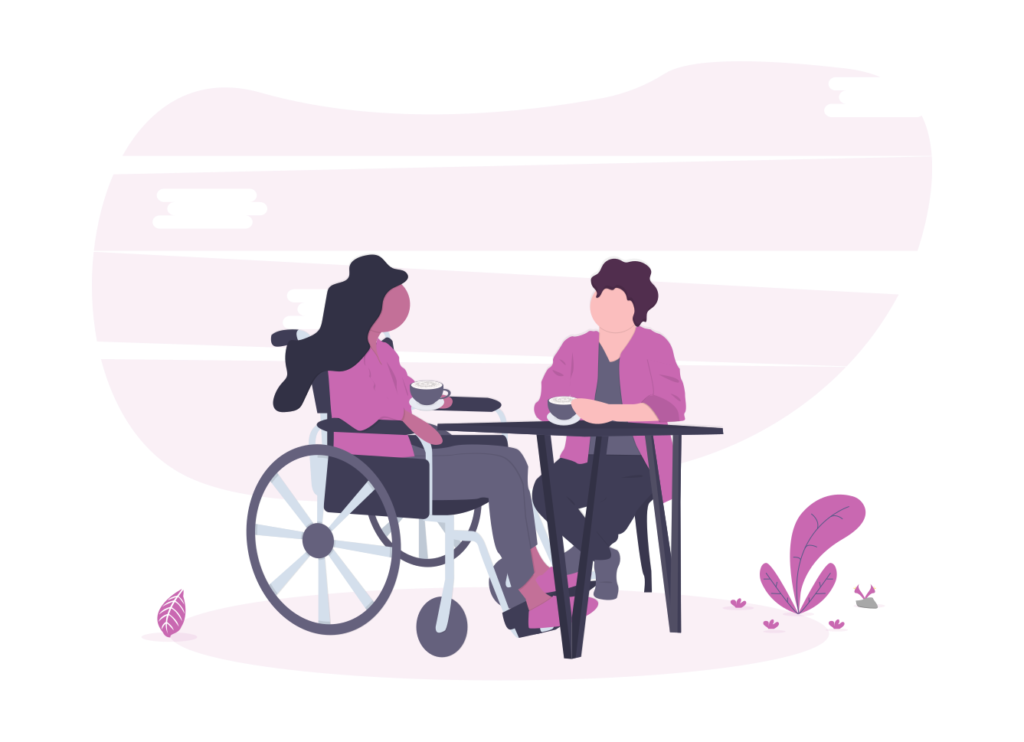Living with a mental health problem can be exhausting. Even the simplest tasks might seem like an uphill battle, and it can leave us feeling trapped, stressed or just a bit lonely. Perhaps the most insidious part of mental health struggles though, is the way they make us feel like no one could ever ‘get’ what we’re going through. Because that couldn’t be further from the truth. So many people have gone through similar experiences and come through the other side — and they may have some pearls of wisdom to share.
Remember it’s completely understandable if you need someone to talk to. Bottling up these painful emotions can be agonising, so admitting you need help is a big step in the right direction. You’re not being a burden. Other people might ‘have it worse’ but that doesn’t make what you’re going through any less difficult. Even the most independent among us need a listening ear to make sense of what they’re going through, so don’t wait until you’re at breaking point to get help.
Prevention is often better than cure when it comes to mental health. And once you get these problems off your chest you might even feel an overwhelming wave of relief. Because you’ll realise that you’re not alone. You’ll see that you have a support network who can catch you when you fall, and help you get back on the right track.
Who should I talk to?
Talk to a friend
Sometimes we need to let out how we’re feeling — and no one quite gets it like a trusted friend. They can give context to a situation, raise our spirits and snap us out of it when we’re ruminating over the same negative thoughts. Plus, they can check in with us and make sure we’re not spiralling out of control.
Open up to a partner
Let’s say you’re having relationship difficulties. You may feel like the honeymoon stage is over and your partner is colder than they used to be, maybe you wish you had better boundaries, or perhaps every little grievance in your relationship turns into a full-blown row. You could stuff down your problems and pretend they don’t exist but odds are they’ll eventually bubble to the surface — and they might even return worse than before.
Making sense of your feelings and sharing them with your partner might be exactly what you need to get out of a romantic rut. Or, if that seems intimidating, Couples Therapy might offer the safe space you need to hash out your problems.
Talk it out with a therapist
Whether you need help with a mental health problem, a relationship difficulty or simply want to work on self-improvement, therapy is a great place to start unpacking your problems. Unlike a friend or partner, your therapist will treat everything you say in strict confidence and can offer an objective view. Think of it as a safe space — a judgement-free zone where you can share all the weird, wonderful or even embarrassing thoughts you may have whirring around your brain. In time, your therapist will help you express how you’re feeling, explore where your problems stem from and teach you coping mechanisms to improve your mental wellbeing.
Mental health charities and communities
Even when we feel like we’ve got no one else to turn to, there’s always someone willing to help. With lockdown you might be finding it difficult to open up to friends and family. But thanks to technology, there are plenty of mental health services at our fingertips, wherever and whenever we need them most. For instance, if you’re in a crisis, you can call Samaritans any time, day or night, on 116 213. Or if you want to connect with a community of people who understand exactly what you’re going through, you could join Side by Side, an online community by the mental health charity Mind. We all know what it’s like to struggle sometimes, and even if it’s online, sharing what you’re going through can be such a powerful thing.

How does talking about our mental health help?
There are practical things we can do to take control of our mental health: we could end an unloving relationship, quit a toxic work environment or practice mindful meditation in the morning. But, arguably there’s one tool in our emotional arsenal that’s equally, if not more, important: talking about our problems.
When you’re in a bad headspace, talking can sometimes seem like the least productive solution in the world. But the reality is, our minds and bodies get a lot out of it.
Here are just a few reasons why:
It gives us perspective
When we’re in a bad place, it’s easy to fall into negative thinking traps. Some of the most common are catastrophising (predicting the worst case scenario), black and white thinking (seeing things in extremes — good or bad, positive or negative) and emotional reasoning (when we base our view according to how we feel rather than the facts). If you tend to ruminate over negative thoughts, you’ll know just how cathartic it can be to talk them out with a friend. It might offer you a fresh perspective and, maybe, you’ll realise that things aren’t quite as bad as they seem. Remember thoughts aren’t facts. So an outsider’s opinion might be just what you need to snap out of a negative thinking pattern.
It helps us name and tame our emotions
There’s an age-old saying that ‘a problem shared is a problem halved’ and that’s particularly true when it comes to our mental health. When we’re caught up in intense feelings (for example, fear, anger or anxiety) our amygdala is in overdrive. This is the part of the brain that, amongst other things, handles our fight or flight response. Research from the University of California, Los Angeles (UCLA) has found that putting our feelings into words (or ‘affect labelling’) can actually help reduce the response of the amygdala when we’re put under emotional distress. Essentially, this means that the clearer you can understand your emotions, the better you can control them.
We can get advice
One in four of us will experience a mental health problem in our lives. So odds are someone you know has experienced, or understands, what you’re going through. If you’re at a loss at what to do, they might be able to offer some sage advice. Maybe they could point you in the direction of a therapist or mental health service. Or perhaps they could share the coping mechanisms and mindful techniques that helped them.

I need to talk to someone about my mental health. But how can I do it properly?
Even when we know it would do us the world of good, sometimes it can be difficult to talk about your mental health. Remember there is strength in vulnerability. But, if you still find it tough, here are a few tips to help you start the conversation…
Choose the right person to talk to
Ever opened up to someone and felt more deflated than before? Chances are you talked to the wrong person. If you’re talking about relationship difficulties they may have their own biases and opinions on the matter, or perhaps they simply aren’t in the right headspace at the moment to help. Talk to a trusted friend who can support you, without enabling any bad habits (e.g. excess alcohol consumption or ruminating over bad thoughts). And if you don’t want to offload onto one person, it might be helpful to speak to multiple people so they don’t get overwhelmed. Try and find someone who has shared experience too. Knowing they’ve been through something similar might make it easier to share and feel heard.
Right time, right place
There’s a time and a place for this conversation, and when you’re sharing vulnerable feelings, it’s only natural that you want to do it somewhere you feel comfortable and safe. Pick a spot where you would feel okay if you got tearful, and maybe stay clear of potential eavesdroppers or prying eyes. It might also be helpful to give your friend a heads up. Ask them if they have the time and emotional capacity to talk about something serious. That way, they won’t be distracted and you’ll both be well-equipped to tackle your problems head on.
Speak to a therapist
As much as our friends and family want to be there for us through thick and thin, if we’re really struggling, it’s important to reach out for professional help. Not only will your therapist provide a listening ear, but unlike a friend, they’re literally trained to help you work through issues – whether they’re big or small.
They’ll also be able to equip you with healthier coping mechanisms and ways of thinking and responding to situations to ensure the same kinds of issues don’t reappear.
Although therapists have a reputation for dealing with mental health issues, you might find therapy useful even if your problems are more surface-level. You could go to therapy if you’re overly stressed, for personal development or simply because you want someone to talk to. Regardless of your goal, chances are you’ll come out of it with a whole new perspective.
Acknowledge the bad – but appreciate the good
Life has its fair share of ups and downs. But when you’re struggling with your mental health, it can feel like one problem always snowballs into another. However, even in our darkest moments, there are often glimmers of joy, whether it’s a cosy coffee date with a friend or a kind message from a relative.
It’s just as important to share these little moments of happiness, as well as our problems. Not only does it help reinforce them in our brains but it also might help us practice gratitude and connect with our loved ones. This doesn’t take away from the hurt and distress we are experiencing, it simply reminds us that we can still find joy in hardship, that life won’t always feel so difficult and that we’ve got a support network who have our back.
